Activity Reports:Japanese Studies and Intellectual Exchange:Report on International Symposium "Human Mobility and Cultural Identity: Lessons for Japan and Germany"
Europe, Middle East and Africa Section
Japanese Studies and Intellectual Exchange Department
(by Ai Goto)
On March 11 and 12, 2009, The Japan Foundation co-hosted the symposium with the Konrad Adenauer Foundation and the Kansai NPO Alliance.
・Click here for the website of symposium
・Click here for the flyer of symposium (PDF/2,147KB)
Participants arrived at Minato-ku, Osaka on March 10, 2009. On March 11, they participated in a closed-door conference of experts for a whole day. On the following day, March 12, they visited two sites for multicultural co-existence in Kobe City in the morning and participated in a public symposium to discuss further with the general public about "human mobility and cultural identity."
Overview
This event was planned as a part of intellectual exchange projects of the Japan Foundation. In intellectual exchange projects, the Japan Foundation has been providing forums for discussion among experts and people in public about issues common to the Europe and Japan or Asian countries. This project was the second year of symposium co-hosting project with the Konrad Adenauer Foundation regarding issues common to Japan and Germany. (For fiscal year 2007, the first year of this project, a symposium on "Family and Work" was held in in Tokyo in March 2008.)
Report of the project 1
Conference of experts on Wednesday, March 11
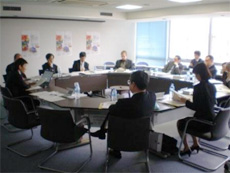 Panelists made reports on their fields of expertise, and all the participants were involved in discussion. The conference started with the keynote speech "Realities surrounding Human Mobility in Japan and Germany" by Professor Yasushi Iguchi, Kwansei Gakuin University. Three sessions followed the speech: "Local level policies" (Session 1), "National/federal level policies" (Session 2), and "Regional integration in Asia and Europe" (Session 3). At each session, participants made reports and discussed the issues, and further discussed about what Asian and European countries could learn from each other as well as objectives of the symposium on the following day.
Panelists made reports on their fields of expertise, and all the participants were involved in discussion. The conference started with the keynote speech "Realities surrounding Human Mobility in Japan and Germany" by Professor Yasushi Iguchi, Kwansei Gakuin University. Three sessions followed the speech: "Local level policies" (Session 1), "National/federal level policies" (Session 2), and "Regional integration in Asia and Europe" (Session 3). At each session, participants made reports and discussed the issues, and further discussed about what Asian and European countries could learn from each other as well as objectives of the symposium on the following day.
Report of the project 2
Sites visitation on Thursday, March 12 in the morning
Participants headed to Kobe where they visited the Furusato no Ie (Special Nursing Home for the Elderly) Kobe operated by the Kokoro no Kazoku Foundation and the Radio FMYY at Takatori Community Center, both in Nagata ward, Kobe City.
The Furusato no Ie was a special nursing home to provide a peaceful facility for elderly people of Korean descent to spend their twilight years far from their birthplace. Participants were particularly interested in the facts that the home was a bilingual environment where residents were taken care of in Korean or Japanese, whichever language they prefer, and that many cultural events were provided so that the residents could enjoy their lives at the home. Participants from abroad were also interested in the fact that, although Japan was said to be a Buddhist country, this Christian facility was established and accepting different religions.
The staff at the Radio FMYY described how the station started. Soon after the Great Hanshin Earthquake hit Kobe City in 1995, prejudice against foreigners was bluntly revealed. People who share an awareness of this issue started constant activities for multicultural coexistence at the Community Center. They were also keenly aware of the importance of multilingual broadcasting in the event of emergency. Their lessons were put to good use when Mid Niigata Prefecture Earthquake occurred in 2007 and they provided supports to foreigners in the earthquake-stricken region. Participants showed their interest in the radio station's attempt to promote the awareness throughout the country based on their experience of severe sufferings from the earthquake.
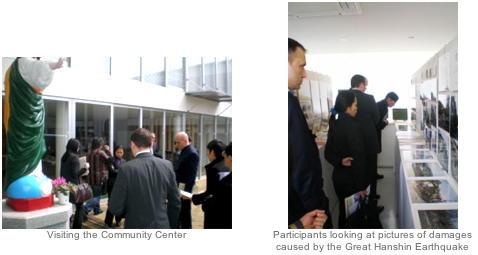
In their spare time, participants visited Kobe Port Emigrants Memorial Statue that commemorated the departure of emigrant ships from Kobe to the world.
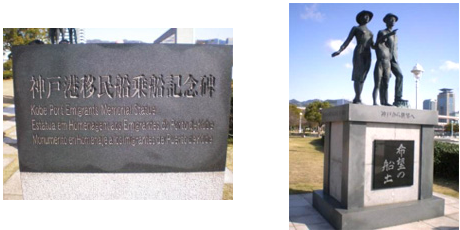
Report of the project 3
Public symposium on Thursday, March 12, at 14:00 - 18:00 ;
After returning from site visitation in Kobe to Osaka, the public symposium was held.
(Hiroshi Inoue, of Nippon Keidanren was not able to attend due to his urgent business.)
[Keynote Address]
At the keynote address, "Realities surrounding Human Mobility in Japan and Germany," Professor Yasushi Iguchi outlined the situation of immigrants in Japan and Germany, and presented the three main issues at this symposium: (1) the issue of identity; (2) comparative view between Asian and European regions; and (3) issues at three different dimentions: local, national, and regional.
[Session 1]
Report of the experts' conference on the previous day
"Issues and Realities Surrounding Human Mobility and Identity at Local, National/Federal, and Regional Levels"
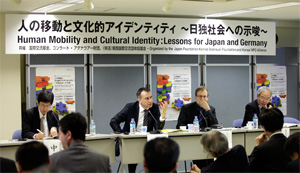 At Session 1, Mr. Akio Nakayama (Special IOM Liaison Mission in Tokyo) played a role of moderator. First, it was explained that the terms "foreigners" and "immigrants" should not be defined as the same. Then, panelists argued that issues of immigrants demanded discussions that involved not only some scholars and policy makers but also general citizens, as was the case in this symposium.
At Session 1, Mr. Akio Nakayama (Special IOM Liaison Mission in Tokyo) played a role of moderator. First, it was explained that the terms "foreigners" and "immigrants" should not be defined as the same. Then, panelists argued that issues of immigrants demanded discussions that involved not only some scholars and policy makers but also general citizens, as was the case in this symposium.
Reports of the experts' conference on the previous day were made as follows: the report of a session on local level policies was made by Prof. Yasuyuki Kitawaki (Tokyo University of Foreign Studies); that on national/federal level policies by Mr. Bülent Arslan (Chair, German-Turkish Forum); and that on regional level policies by Dr. Pontus Odmalm (Lecturer, University of Edinburgh).
These reports indicated that host countries of migrants had been adopting "assimilation," "segregation," or "multiculturalism" policy as the occasion demanded. Presenters of reports pointed out that, although migration policies were often discussed from the standpoint of "management" or "control" of migrants, discussions at each of local, national/federal, or regional level had to give due consideration to measures for protection of personal dignity and human rights of migrants.
[Session 2]
Panel Discussion
"Human Mobility and Regional Integration in East Asia and Europe: Today and Future of Identity of Individuals, Nations, and Regions"
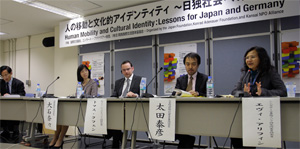 With Prof. Yasushi Iguchi (Kwansei Gakuin University) as a moderator, Session 2 started with following panelists: Prof. Nana Oishi (International Christian University), Mr. Thomas Kufen (State Commissioner for Migration of the Federal State of North Rhine-Westphalia), Mr. Yasuhiko Ota (Senior Writer / Editorial Writer, Nikkei Inc.), and Dr. Evi Arifin (Visiting research fellow, the Institute of Southeast Asian Studies (ISEAS)).
With Prof. Yasushi Iguchi (Kwansei Gakuin University) as a moderator, Session 2 started with following panelists: Prof. Nana Oishi (International Christian University), Mr. Thomas Kufen (State Commissioner for Migration of the Federal State of North Rhine-Westphalia), Mr. Yasuhiko Ota (Senior Writer / Editorial Writer, Nikkei Inc.), and Dr. Evi Arifin (Visiting research fellow, the Institute of Southeast Asian Studies (ISEAS)).
The moderator presented four issues: (1) human resources development; (2) partnership between national and local governments; (3) responsibilities of host countries (interactivity); and (4) possibilities of identities (based on regions, such as Europeans, Asians, etc.). Based on these issues, panelists discussed that host countries were required to foster human resources who were capable of adapting to multiple cultures with curiosity by encouraging studying abroad and consolidating the systems. In addition, realities and the future of multilingual education for immigrants at public education were also discussed. Some panelists pointed out that distinction by nationalities, such as "Japanese" or "German" did not always agree with that by appearances of people. Therefore, they argued, it was important that we should not be quick to determine a person's nationality solely by his or her appearance and we should interact people with imagination.
As wrap-up and policy suggestions by the chair, Prof. Yasushi Iguchi reminded panelists and audience that Japan should review its future from the standpoint that the country would cooperate with Asian countries that would keep growing in the future. He also emphasized that discussions and practices should be continued to realize the society where each person can live with dignity without being discriminated based on his or her nationality.
Comments from audience
84 people gathered as audience for this public symposium. During the symposium, there were two occasions to collect sheets of questions to the panelists from the audience, and many of them took up as much time as possible to fill the entire sheet with their comments. Over 90% of the respondents (49 persons) answered they were "very satisfied" or "somehow satisfied." Here are some of positive comments: "I was satisfied with the contents." "Discussions among the panelists were meaningful." "There were interesting opinions on the issue of identity." "I have learned a lot." On the other hand, some of the respondents expressed their dissatisfaction: "More comparisons between Japan and Germany should have been made." "I wanted to hear comments on the issue of identity unique to immigrants." "Each session was too short."
Conclusion
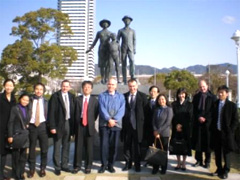 We are grateful to everyone who participated or visited this symposium on March 12, 2009. This was an attempt to discuss quite a few issues in a short period of two days, and we sincerely wish that everyone who attended this symposium received some new insights about coexistence of people with various backgrounds in Asia and Europe.
We are grateful to everyone who participated or visited this symposium on March 12, 2009. This was an attempt to discuss quite a few issues in a short period of two days, and we sincerely wish that everyone who attended this symposium received some new insights about coexistence of people with various backgrounds in Asia and Europe.
All the best for each and every one of your own pursuit of "human mobility" and "identity"!
Related Articles
Back Issues
- 2025.9.30 The 51st Japan Found…
- 2025.9.30 The Japan Foundation…
- 2025.9.30 Bringing the World C…
- 2025.9.30 The 51st (2024) Japa…
- 2025.9.30 Japan Foundation Pri…
- 2024.5.24 The 50th Japan Found…
- 2024.3. 4 Movie Theaters aroun…
- 2023.4.10 The 49th Japan Found…
- 2023.3.28 JF's Initiatives for…
- 2023.1.27 Living Together with…

